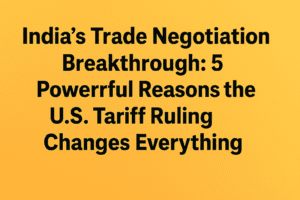India’s Trade Negotiation Breakthrough: 5 Powerful Reasons the U.S. Tariff Ruling Changes Everything
A landmark U.S. court ruling declaring Trump’s “Liberation Day” tariffs unconstitutional fundamentally weakens a key source of American leverage in ongoing India-U.S. FTA talks. Trade experts urge India to pause and strategically reassess its negotiation position, arguing concessions potentially made under the threat of these now-illegal tariffs should be reconsidered. The ruling invalidates tariffs exceeding presidential authority under the 1977 IEEPA, removing a significant coercive tool.
India must use this window to shift from a defensive posture towards proactively advancing its core interests—like services, skilled mobility, and pharmaceuticals—on a more balanced footing. With U.S. negotiators arriving June 5-6, India has a critical opportunity to advocate for a durable agreement based on mutual benefit and rule-based trade, not past pressure tactics. This legal reset demands a recalibration ensuring the final FTA fairly serves India’s long-term economic goals.

India’s Trade Negotiation Breakthrough: 5 Powerful Reasons the U.S. Tariff Ruling Changes Everything
The recent U.S. Court of International Trade decision striking down former President Trump’s “Liberation Day” tariffs isn’t just a legal footnote – it’s a potential game-changer for India’s high-stakes Free Trade Agreement (FTA) negotiations with the United States. While the Indian government quietly assesses the ruling’s impact, trade experts see a critical window of opportunity opening for New Delhi to strategically recalibrate its approach.
The Ruling: Unpicking Presidential Power
On May 28th, the court delivered a significant blow, declaring the tariffs imposed under the 1977 International Emergency Economic Powers Act (IEEPA) as exceeding presidential authority. The core finding: IEEPA does not grant the President “unbounded authority” for sweeping global tariffs. The court explicitly stated the tariffs were not a lawful response to the declared threats, rendering them unconstitutional. While the tariffs were already paused until July 8th, the ruling fundamentally undermines their legal basis.
Why This Matters Deeply for India
For India, these tariffs weren’t abstract policy; they were tangible pressure points. Trump’s Section 232 tariffs on steel and aluminum, and later the Section 301 tariffs targeting various countries, significantly impacted Indian exports. While some exemptions were negotiated, the threat of these tariffs, often wielded unilaterally, cast a long shadow over trade relations and created leverage for the U.S. in negotiations.
The Expert Mandate: Pause, Reflect, Reassess
Trade analysts argue India must seize this moment. “This ruling is a crucial inflection point,” emphasizes Ajay Srivastava, former Director General of Foreign Trade. “India should resist any agreement shaped by threats or based on unlawful measures. Not only do these Trump-era tariffs violate World Trade Organization rules, but the U.S. court has now confirmed they also breach U.S. domestic law.”
The key insight: The legal invalidation of the tariffs weakens a major source of U.S. leverage. The implicit or explicit threat of their reinstatement, which could have been used to pressure concessions in the FTA, now stands on legally fractured ground.
Strategic Imperatives for India’s FTA Negotiation
- Re-evaluate Concessions Made Under Duress: Did previous negotiation positions factor in the potential damage from these tariffs? With their legal foundation crumbling, India needs to scrutinize whether concessions offered to mitigate tariff threats are still necessary or proportionate.
- Strengthen Legal and Rule-Based Arguments: The ruling reinforces the principle that trade actions must operate within established legal frameworks, both domestic and international (like the WTO). India can confidently emphasize adherence to rules-based systems in negotiations, pushing back against unilateralism.
- Focus on Core Interests, Not Defensive Maneuvers: Freed from the immediate pressure of defending against these specific tariffs, India can potentially shift focus from reactive positions to proactively advancing its own key priorities in the FTA – be it services trade, easier mobility for professionals, agricultural market access, or robust protection for its generic pharmaceuticals sector.
- Assess Long-Term U.S. Trade Policy Stability: The ruling highlights the volatility of U.S. trade policy tied to executive power. India must carefully weigh how any FTA provisions might withstand future shifts in U.S. political winds and potential legal challenges to unilateral actions.
The Negotiation Context: Timing is Key
Adding urgency is the confirmed arrival of the U.S. FTA negotiation team in India on June 5-6. While official sources describe talks as “progressing well,” this court ruling injects a significant new variable. India’s Commerce Ministry team, fresh from U.S. talks, now has a powerful new piece of analytical context as they prepare for the next round.
The Path Forward: Beyond Tariffs to True Partnership
The U.S. court decision isn’t about “winning” or “losing” a single issue. It’s about restoring equilibrium. It removes a tool of coercion, allowing negotiations to potentially proceed on a more balanced footing focused on mutual economic benefit rather than mitigating unlawful threats.
India’s challenge is to leverage this moment not for delay, but for strategic clarity. By pausing to reassess its position in light of this changed legal landscape, India can negotiate from a position of greater confidence, aiming for an FTA that is durable, equitable, and truly serves its long-term economic interests – an agreement built on partnership, not pressure. The opportunity lies in transforming a legal victory against past overreach into a foundation for a fairer future trade relationship.
You must be logged in to post a comment.